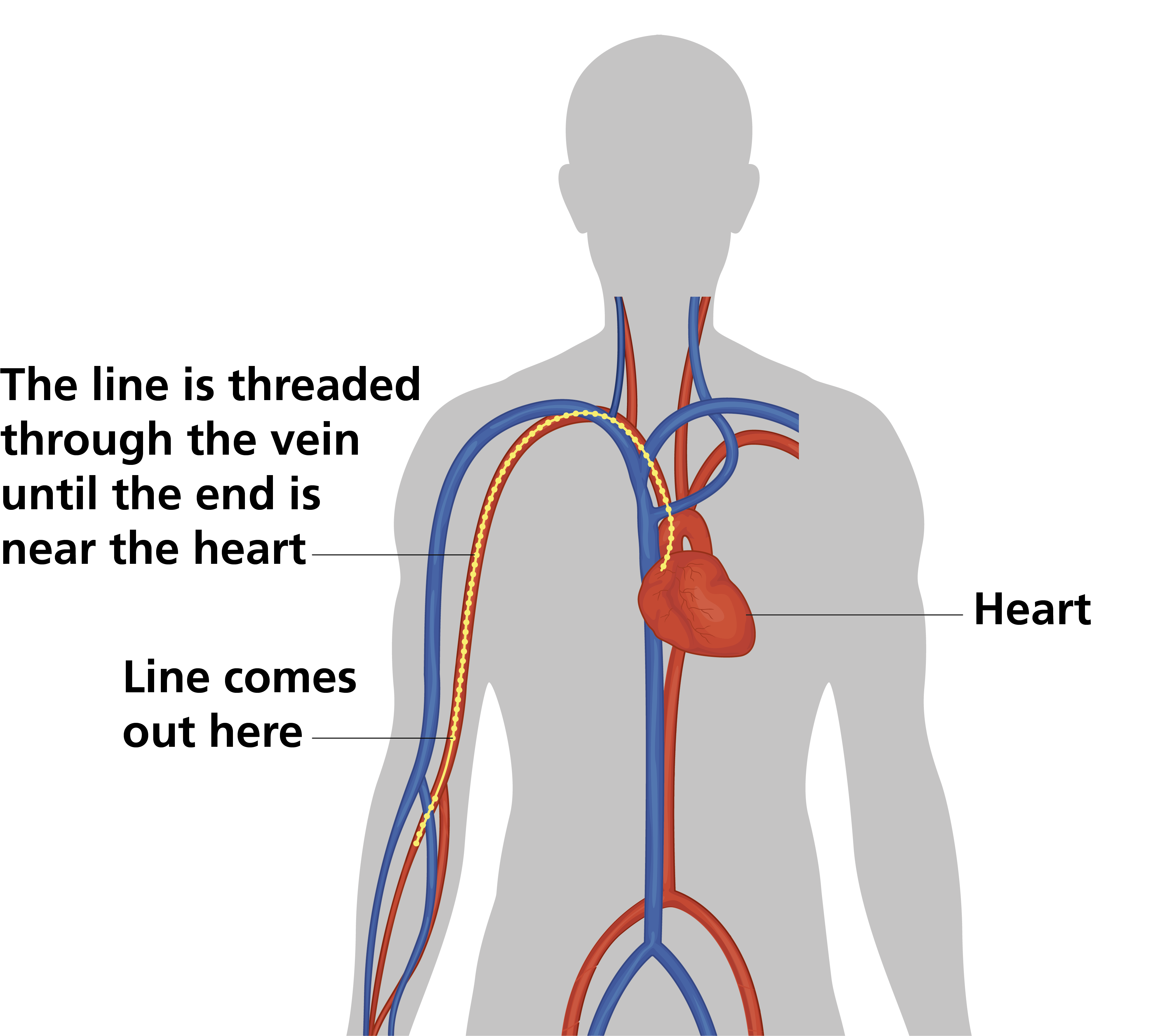
Peripherally Inserted Central Catheter (PICC line)
What is a PICC line?
A PICC line is a long narrow flexible tube that is inserted into one of the veins in the arm. The tip of the PICC line sits in a big vein, just above your heart. The other end of the line comes out of the arm and is secured with a fixation device and clear adhesive dressing. The centre of the PICC is called the lumen.
 Why do I need a PICC line?
Why do I need a PICC line?
If you are a Bone Infection Service patient your PICC line will have been inserted so that you can receive Intravenous (IV) antibiotics for between 6 weeks and 3 months dependant on treatment plan. Blood samples can also be taken from this line. The line will make your treatment more comfortable by:
- Reducing the irritation that some drugs may cause
- Preserving the health of your blood vessels
- Preventing the need for multiple needle punctures
The PICC line should only be used by the ROCS nurses for prescribed intravenous antibiotics. No other drugs should be administered.
When will my PICC line be removed?
Your PICC line will be removed as soon as your intravenous treatment has completed. This will normally be done at home with two ROCS nurses present. You will be asked to lie down and hold your breath for a few seconds while the line is being removed to prevent any air entering the site. Your observations will be taken throughout. After removal compression will be applied for a few minutes to prevent bleeding then a dressing will be applied after which should remain on for a couple of days.
What are the risks of having a PICC line and what should I be looking out for?
Infection
There is a small risk of infection occurring in or around the line. This can happen at any time while the PICC line is in place. Every precaution is taken to prevent infection when the line is placed and every time the line is accessed. Please inform the ROCS team as soon as possible if you have any signs and symptoms including: redness, inflammation or pain around the insertion site.
Please note: if infection develops further sepsis can occur, symptoms include: slurred speech, confusion, extreme shivering, muscle pain, passing no urine in a day, severe breathlessness, skin being mottled or discoloured. If you have any of these symptoms you must call 999 immediately.
Thrombus or clot
In some cases, a clot can form around the PICC line.
Signs and symptoms include: a painful, swollen arm, neck or chest.
If any of these symptoms occur, please visit your local Emergency Department for an urgent review and inform the ROCS team.
Malposition
In some cases, the tip of the line may not be in the correct position, you should have had a chest x-ray prior to line use to confirm position. There is also a possibility that the line could move or come out if the dressing becomes loose.
Look out for any increase in the external length of the PICC line and ensure that the dressing is secure. If this occurs, please contact the ROCS team as soon as possible.
Bleeding and bruising around the insertion site
Sometimes there is a small ooze of blood from the insertion site, your dressing will be changed 24hrs after insertion and then again, every 7 days unless it becomes loose or soiled prior to then.
Look out for any bleeding or leaking around the insertion site or dressing. If this occurs, please contact the ROCS team as soon as possible.
How should I look after my PICC line when washing?
Please keep your PICC line dry by using a waterproof cover or wrapping your arm in cling film when washing. Do not submerge you PICC line in water.
Concerns
If you have any concerns regarding your PICC line please contact the ROCS team or the Bone Infection Service on the contact numbers below. If you have any chest pain, shortness of breath or SEPSIS symptoms (slurred speech, confusion, extreme shivering, muscle pain, passing no urine in a day, severe breathlessness, skin mottled or discoloured) call 999 without delay.
Contact numbers
ROCS Team: 0121 812 3277, 9am - 5pm (7 days a week).
An answer machine is available for you to leave a message outside of these hours if your concern is non-urgent.
Bone Infection Service: 0121 312 3312, 8am - 4pm (Mon-Fri)